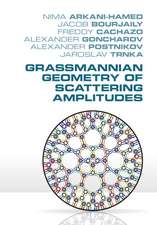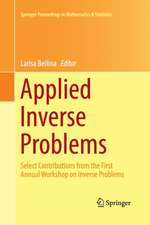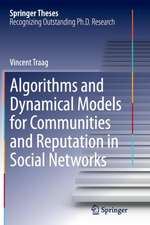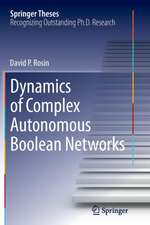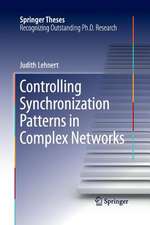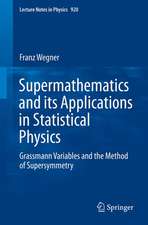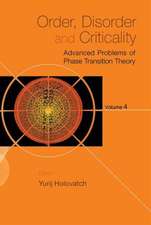3rd International Winter School and Conference on Network Science: NetSci-X 2017: Springer Proceedings in Complexity
Editat de Erez Shmueli, Baruch Barzel, Rami Puzisen Limba Engleză Hardback – 6 mai 2017
Many natural phenomena can be modeled as networks where nodes are the primitive compounds and links represent their interactions, similarities, or distances of sorts. Complex networks have an enormous impact on research in various fields like biology, social sciences, engineering, and cyber-security to name a few. The topology of a network often encompasses important information on the functionality and dynamics of the system or the phenomenon it represents. Network science is an emerging interdisciplinary discipline that provides tools and insights to researchers in a variety of domains.
NetSci-X is the central winter conference within the field and brings together leading researchers and innovators to connect, meet, and establish interdisciplinary channels forcollaboration. It is the largest and best known event in the area of network science.
This text demonstrates how ideas formulated by authors with different backgrounds are transformed into models, methods, and algorithms that are used to study complex systems across different domains and will appeal to researchers and students within in the field.
| Toate formatele și edițiile | Preț | Express |
|---|---|---|
| Paperback (1) | 379.09 lei 6-8 săpt. | |
| Springer International Publishing – 25 iul 2018 | 379.09 lei 6-8 săpt. | |
| Hardback (1) | 386.22 lei 6-8 săpt. | |
| Springer International Publishing – 6 mai 2017 | 386.22 lei 6-8 săpt. |
Din seria Springer Proceedings in Complexity
- 20%
 Preț: 1128.80 lei
Preț: 1128.80 lei - 18%
 Preț: 1240.16 lei
Preț: 1240.16 lei - 18%
 Preț: 1214.09 lei
Preț: 1214.09 lei -
 Preț: 497.13 lei
Preț: 497.13 lei - 18%
 Preț: 1112.30 lei
Preț: 1112.30 lei - 18%
 Preț: 1300.10 lei
Preț: 1300.10 lei - 20%
 Preț: 1084.83 lei
Preț: 1084.83 lei - 18%
 Preț: 1393.27 lei
Preț: 1393.27 lei - 18%
 Preț: 961.55 lei
Preț: 961.55 lei - 20%
 Preț: 646.95 lei
Preț: 646.95 lei - 15%
 Preț: 641.71 lei
Preț: 641.71 lei - 18%
 Preț: 1395.32 lei
Preț: 1395.32 lei - 18%
 Preț: 952.89 lei
Preț: 952.89 lei - 20%
 Preț: 646.12 lei
Preț: 646.12 lei - 20%
 Preț: 571.27 lei
Preț: 571.27 lei - 20%
 Preț: 1288.76 lei
Preț: 1288.76 lei - 18%
 Preț: 1125.55 lei
Preț: 1125.55 lei - 15%
 Preț: 643.34 lei
Preț: 643.34 lei - 18%
 Preț: 947.04 lei
Preț: 947.04 lei - 24%
 Preț: 839.38 lei
Preț: 839.38 lei - 18%
 Preț: 1251.98 lei
Preț: 1251.98 lei - 18%
 Preț: 1670.11 lei
Preț: 1670.11 lei - 18%
 Preț: 1223.25 lei
Preț: 1223.25 lei - 18%
 Preț: 974.04 lei
Preț: 974.04 lei - 15%
 Preț: 646.11 lei
Preț: 646.11 lei - 18%
 Preț: 1225.16 lei
Preț: 1225.16 lei - 15%
 Preț: 645.79 lei
Preț: 645.79 lei - 18%
 Preț: 957.32 lei
Preț: 957.32 lei - 20%
 Preț: 984.18 lei
Preț: 984.18 lei - 15%
 Preț: 643.84 lei
Preț: 643.84 lei - 15%
 Preț: 644.63 lei
Preț: 644.63 lei - 18%
 Preț: 1236.51 lei
Preț: 1236.51 lei - 18%
 Preț: 1223.25 lei
Preț: 1223.25 lei - 18%
 Preț: 964.86 lei
Preț: 964.86 lei - 18%
 Preț: 1278.82 lei
Preț: 1278.82 lei - 18%
 Preț: 1217.41 lei
Preț: 1217.41 lei - 24%
 Preț: 1067.23 lei
Preț: 1067.23 lei -
 Preț: 424.99 lei
Preț: 424.99 lei - 18%
 Preț: 1236.69 lei
Preț: 1236.69 lei - 20%
 Preț: 1277.57 lei
Preț: 1277.57 lei -
 Preț: 424.81 lei
Preț: 424.81 lei - 24%
 Preț: 1084.90 lei
Preț: 1084.90 lei
Preț: 386.22 lei
Nou
Puncte Express: 579
Preț estimativ în valută:
73.90€ • 77.37$ • 61.15£
73.90€ • 77.37$ • 61.15£
Carte tipărită la comandă
Livrare economică 05-19 aprilie
Preluare comenzi: 021 569.72.76
Specificații
ISBN-13: 9783319554709
ISBN-10: 3319554700
Pagini: 130
Ilustrații: VI, 130 p. 32 illus., 17 illus. in color.
Dimensiuni: 155 x 235 x 10 mm
Greutate: 0.37 kg
Ediția:1st ed. 2017
Editura: Springer International Publishing
Colecția Springer
Seria Springer Proceedings in Complexity
Locul publicării:Cham, Switzerland
ISBN-10: 3319554700
Pagini: 130
Ilustrații: VI, 130 p. 32 illus., 17 illus. in color.
Dimensiuni: 155 x 235 x 10 mm
Greutate: 0.37 kg
Ediția:1st ed. 2017
Editura: Springer International Publishing
Colecția Springer
Seria Springer Proceedings in Complexity
Locul publicării:Cham, Switzerland
Cuprins
Chapter1. Node-Centric Detection of Overlapping Communities in Social Networks.- Chapter2. Community structures evaluation in complex networks: A descriptive approach.- Chapter3. Do Network Models Just Model Networks? On The Applicability of Network Oriented Modeling.- Chapter4. Visibility of nodes in network growth models.- Chapter5. Topology data analysis of critical transitions in financial networks.- Chapter6. Modeling and Analysis of Glass Ceiling and Power Inequality in Bi-populated Societies.- Chapter7. Elites in Social Networks: An Axiomatic Approach.- Chapter8. Ranking scientific papers on the basis of their citations growing trend.- Chapter9. Towards network economics: the problem of the network modus of value.- Chapter10. Open Questions in Multidimensional Multilevel Network Science.
Notă biografică
Rami Puzis:
Dr Rami Puzis is a faculty member at the Department of Software and Information Systems Engineering at Ben-Gurion University of the Negev, where he has graduated BSc in Software Engineering, MSc and PhD in Information Systems Engineering. Rami was a post-doctoral research associate in the Lab for Computational Cultural Dynamics, University of Maryland. His main research interests include network analysis with applications to security, social networks, computer communication, and simulations. Over the past years Rami has managed multiple research projects funded by Deutsche Telekom AG, Israeli Ministry of Defense, Israeli Ministry of Trade and Commerce, and leading cyber security industries in Israel.
Erez Shmueli:
Dr. Erez Shmueli is a senior lecturer and the head of the Big Data Lab at the department of Industrial Engineering at Tel-Aviv University, and a research affiliate at the MIT Media Lab. He received his BA degree (with honors)in Computer Science from the Open University of Israel, and MSc and PhD degrees in Information Systems Engineering from Ben-Gurion University of the Negev, Israel, under the supervision of Prof. Yuval Elovici. After completing his PhD, he spent two years as a post-doctoral associate at the MIT Media Lab, at the Human Dynamics group headed by Prof. Alex 'Sandy' Pentland. His research interests include Big Data, Complex Networks, Computational Social Science, Machine Learning, Recommender Systems, Database Systems, Information Security and Privacy. His professional experience includes being a programmer and a team leader in the Israeli Air-Force and a project manager in Deutsche Telekom Laboratories at Ben-Gurion University of the Negev.Baruch Barzel:
Dr. Baruch Barzel is a senior lecturer and the head of the Complex Network Dynamics Lab at the department of Mathematics of Bar-Ilan University. He received his B.Sc. degree (with honors) in Physics and Chemistry from the Hebrew University of Jerusalem, Israel, as well as his M.Sc. and Ph.D. degrees in Physics, conducted under the supervision of Prof. Ofer Biham, as a Hoffman Fellow. After completing his PhD, Baruch continued to pursue post-doctoral research at the Center for Complex Network Research of Northeastern University, Boston, headed by Prof. Albert-László Barabási, and at the Channing Division of Network Medicine of the Harvard Medical School, under the guidance of Dr. Yang-Yu Liu. His research interests include Complex Networks, Network Dynamics, Stochastic Systems, Nonlinear Physics and Complex Systems.
Dr Rami Puzis is a faculty member at the Department of Software and Information Systems Engineering at Ben-Gurion University of the Negev, where he has graduated BSc in Software Engineering, MSc and PhD in Information Systems Engineering. Rami was a post-doctoral research associate in the Lab for Computational Cultural Dynamics, University of Maryland. His main research interests include network analysis with applications to security, social networks, computer communication, and simulations. Over the past years Rami has managed multiple research projects funded by Deutsche Telekom AG, Israeli Ministry of Defense, Israeli Ministry of Trade and Commerce, and leading cyber security industries in Israel.
Erez Shmueli:
Dr. Erez Shmueli is a senior lecturer and the head of the Big Data Lab at the department of Industrial Engineering at Tel-Aviv University, and a research affiliate at the MIT Media Lab. He received his BA degree (with honors)in Computer Science from the Open University of Israel, and MSc and PhD degrees in Information Systems Engineering from Ben-Gurion University of the Negev, Israel, under the supervision of Prof. Yuval Elovici. After completing his PhD, he spent two years as a post-doctoral associate at the MIT Media Lab, at the Human Dynamics group headed by Prof. Alex 'Sandy' Pentland. His research interests include Big Data, Complex Networks, Computational Social Science, Machine Learning, Recommender Systems, Database Systems, Information Security and Privacy. His professional experience includes being a programmer and a team leader in the Israeli Air-Force and a project manager in Deutsche Telekom Laboratories at Ben-Gurion University of the Negev.Baruch Barzel:
Dr. Baruch Barzel is a senior lecturer and the head of the Complex Network Dynamics Lab at the department of Mathematics of Bar-Ilan University. He received his B.Sc. degree (with honors) in Physics and Chemistry from the Hebrew University of Jerusalem, Israel, as well as his M.Sc. and Ph.D. degrees in Physics, conducted under the supervision of Prof. Ofer Biham, as a Hoffman Fellow. After completing his PhD, Baruch continued to pursue post-doctoral research at the Center for Complex Network Research of Northeastern University, Boston, headed by Prof. Albert-László Barabási, and at the Channing Division of Network Medicine of the Harvard Medical School, under the guidance of Dr. Yang-Yu Liu. His research interests include Complex Networks, Network Dynamics, Stochastic Systems, Nonlinear Physics and Complex Systems.
Textul de pe ultima copertă
This book contains original research chapters related to the interdisciplinary field of complex networks spanning biological and environmental networks, social, technological, and economic networks.
Many natural phenomena can be modeled as networks where nodes are the primitive compounds and links represent their interactions, similarities, or distances of sorts. Complex networks have an enormous impact on research in various fields like biology, social sciences, engineering, and cyber-security to name a few. The topology of a network often encompasses important information on the functionality and dynamics of the system or the phenomenon it represents. Network science is an emerging interdisciplinary discipline that provides tools and insights to researchers in a variety of domains.
NetSci-X is the central winter conference within the field and brings together leading researchers and innovators to connect, meet, and establish interdisciplinary channels forcollaboration. It is the largest and best known event in the area of network science. This text demonstrates how ideas formulated by authors with different backgrounds are transformed into models, methods, and algorithms that are used to study complex systems across different domains and will appeal to researchers and students within in the field.
Many natural phenomena can be modeled as networks where nodes are the primitive compounds and links represent their interactions, similarities, or distances of sorts. Complex networks have an enormous impact on research in various fields like biology, social sciences, engineering, and cyber-security to name a few. The topology of a network often encompasses important information on the functionality and dynamics of the system or the phenomenon it represents. Network science is an emerging interdisciplinary discipline that provides tools and insights to researchers in a variety of domains.
NetSci-X is the central winter conference within the field and brings together leading researchers and innovators to connect, meet, and establish interdisciplinary channels forcollaboration. It is the largest and best known event in the area of network science. This text demonstrates how ideas formulated by authors with different backgrounds are transformed into models, methods, and algorithms that are used to study complex systems across different domains and will appeal to researchers and students within in the field.
Caracteristici
Includes supplementary material: sn.pub/extras



